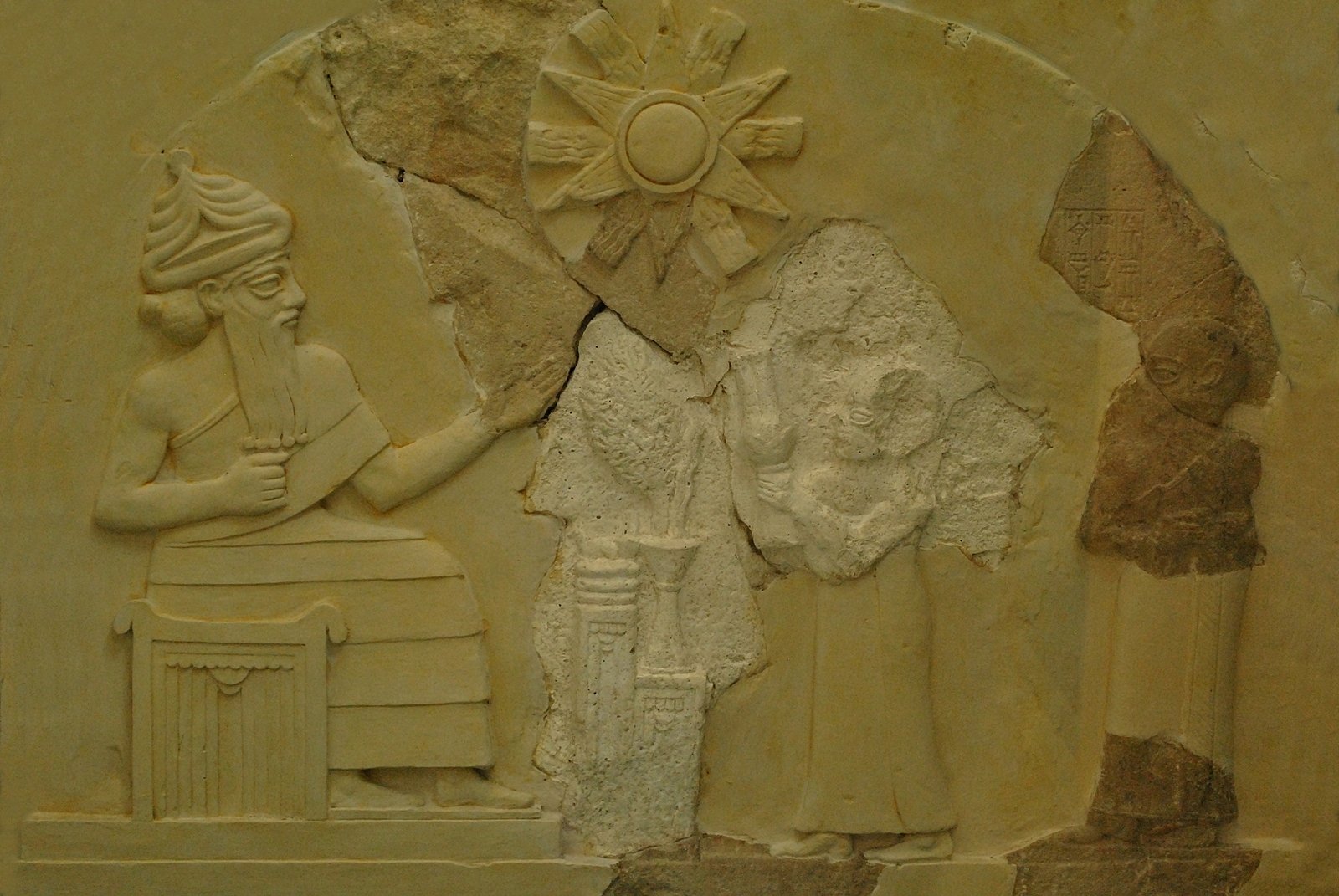
Amidst the ancient expanse of Mesopotamia’s heart, an intricate tapestry of divine beings interwove the very essence of faith, crafting a mosaic that sculpted the inhabitants’ comprehension of the universe.
The Mesopotamian celestial assembly, akin to an ethereal court, commanded dominion over each facet of existence, orchestrating from the lofty heavens to the fecund embrace of the terrestrial realm.
In this exploration, we journey into the depths of this divine realm, uncovering the majesty and significance of its major deities, as well as the lesser-known yet equally important figures that colored the spiritual landscape of the time.
The Major Gods and Goddesses
The Mesopotamian pantheon is hierarchical, with a preeminent god at the top. The seven most significant divine beings and goddesses are:
- Read also: A Glimpse into the Sumerian Civilization Timeline
- Read also: The Fascinating of Aztec Mythology
An (Anu)
At the pinnacle of the pantheon, majestically stands An, the revered sky god and supreme ruler of the divine realm.
His celestial dominion stretches across the vast expanse of the heavens, symbolizing the boundless magnitude that envelops and sustains all living beings.
With his benevolent gaze, he watches over the cosmic tapestry of existence, ensuring harmony and order prevail in the cosmic symphony of life.
Enlil
Beneath An’s lofty realm, Enlil, the powerful air and storm god, reigns supreme.
With his thunderous might, he commands the forces of nature, conjuring up fierce storms and tempests that shape the very fabric of the world.
As a divine arbitrator of destinies, Enlil not only maintains cosmic order but also weaves intricate tapestries of fate, intricately connecting the lives of mortals and immortals alike.
Enki (Ea)
In the vast and mysterious depths of the water, one can encounter Enki, the revered god of wisdom and crafts.
With his divine presence, he governs the life-giving waters, bestowing his benevolent guidance upon all.
Not only does Enki nurture wisdom and invention, but he also plays a vital role in shaping the direction of human affairs, ensuring a harmonious and prosperous existence for all who seek his blessings.
Nanna (Sin)
In the tranquil glow of the moon, Nanna, the moon god, casts his gentle light upon the earth, illuminating the night sky with a mesmerizing silver hue.
As his ethereal beams cascade down, they not only mark the passage of time but also possess the power to inspire and nurture fertility, fostering the growth of life in all its splendid forms.
From the delicate sprouts reaching towards the heavens to the blooming flowers adorning the landscape, every living being basked in the enchanting radiance bestowed by Nanna, a celestial guardian of beauty and vitality.
Utu (Shamash)
In ancient mythology, the sun god Utu, also known as Shamash, emerges with radiant brilliance, casting his golden rays upon the world.
With his divine presence, he illuminates the path of truth and justice, ensuring that righteousness prevails.
As a dispenser of divine justice, his unwavering gaze pierces through the darkest shadows, upholding the moral order and bringing forth harmony and balance to all.
Inanna (Ishtar)
The goddess of multifaceted nature, Inanna, encompasses the intricate realms of love, war, and fertility.
With her radiant presence, she embodies not only the passionate embrace of love, but also the fierce determination in times of conflict, and the abundant creativity that springs forth in the cycle of life.
Inanna’s dual aspects beautifully mirror the diverse facets of human existence, illustrating the delicate balance between creation and destruction, growth and decay, and the eternal dance of life’s ever-changing tapestry.
Ninhursag
Known as both Ninhursag and Nintu, this revered maternal figure is not only the nurturing mother goddess but also the compassionate source of healing, mirroring the earth’s boundless capacity for renewal, sustenance, and the eternal cycle of life.
With her gentle touch and divine presence, she embraces all living beings and bestows upon them the bountiful blessings of love, solace, and rejuvenation.
Other Important Gods and Goddesses

In addition to the seven major gods and goddesses, there are other important gods and goddesses in Mesopotamian mythology who are equally influential. They include:
Marduk (Bel)
Rising to prominence in the ancient city of Babylon, Marduk, the god of exceptional might and valor, emerges as a powerful figure symbolizing the city’s ascension to greatness.
His heroic deeds, celebrated in epic tales such as the Enuma Elish, have become the stuff of legends, inspiring awe and reverence among generations.
With his unflinching strength and boldness, Marduk remains a demonstration of the unstoppable soul and flexibility of the Babylonian civilization.
Tiamat
In an entrancing vast dance of mayhem and creation, Tiamat arises as the exemplification of the early stage pit, an unlimited power overflowing with crude potential.
This awe-inspiring entity assumes the dual role of both the formidable antagonist and the transformative catalyst within the ancient Mesopotamian epic known as the Enuma Elish.
Adad
In the pantheon of divinities, the powerful Akkadian storm god, Adad, rules with his unflinching control over the blustery powers of nature.
From the sky above, he releases nurturing downpours upon the dry earth, supporting the yields and supporting every single living being.
Yet, such immense power comes with a double-edged sword, as Adad also wields the ability to summon devastating floods that can reshape the very landscape.
Ishkhara (Ishtar)
In the Akkadian tradition, Ishtar, the captivating goddess of love and war, reigns supreme with her vibrant persona.
She bestows her divine influence not only in matters of love and war but also extends her benevolent hand towards fertility and the pursuit of justice, ensuring harmony and prosperity in the ancient realm.
Nergal
As the formidable guardian of the underworld, Nergal reigns over the intricate tapestry of death and rebirth, skillfully navigating the souls through the mystical realms of the afterlife.
With an unwavering presence and profound wisdom, he safeguards the delicate balance between existence and transcendence, ensuring the eternal journey of the departed is guided with utmost care and reverence.
Ereshkigal
In the shadowed depths of the netherworld, where darkness shrouds the land and whispers of the past echo through the eternal abyss, Ereshkigal, the formidable queen, reigns with unwavering authority.
With her piercing gaze and commanding presence, she oversees the realm of the deceased, guiding lost souls and presiding over the eternal cycle of life and death.
The Mesopotamian Pantheon and Its Influence:
In ancient Mesopotamia, the gods and goddesses were not just distant figures but actively participated in the daily lives of the people.
Through elaborate rituals, offerings, and unwavering devotion, individuals sought to gain the favor of the divine beings, firmly believing that their intervention could profoundly impact their world in unimaginable ways.
The gods’ influence was all-encompassing, extending to every facet of existence – from ensuring bountiful harvests to securing victories in epic battles.
The stories and myths surrounding these deities were meticulously recorded on clay tablets, serving as the pillars of Mesopotamian literature, art, and worldview.
These tales not only provided moral guidance and ethical principles but also shaped the very identity of the people.
- Read also: African Mythology: Tales of Gods, Heroes, and Magical Creatures
- Read also: Mayan Mythology: A Journey through the Ancient Civilization
Conclusion
Within the annals of antiquity, the Mesopotamian pantheon emerges as a testament to humanity’s ceaseless allure with the divine realm, an intricate mosaic of celestial beings that reflect the multifaceted tapestry of existence itself.
Each deity, a luminary in this grand cosmic symphony, is intricately woven into the very essence of life along the fertile banks of the Tigris and Euphrates rivers.
As we embark on a profound odyssey through the historical epochs of this ancient civilization, the haunting echoes of their reverence reverberate across time, an indelible reminder of the enduring allure of mythology and humanity’s unyielding quest to unravel the enigmatic threads of the cosmos.



